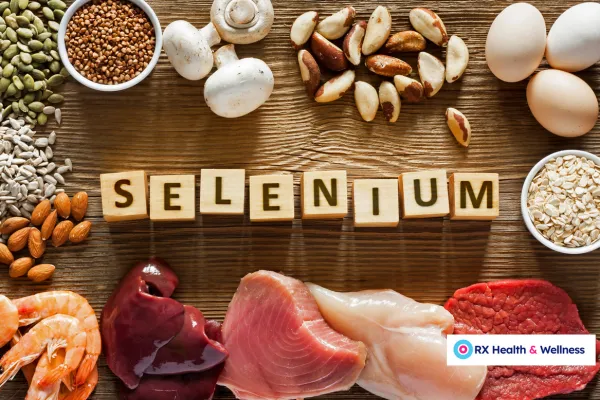
Selenium
Selenium: The Mighty Trace Mineral for Your Health
Selenium is a trace mineral your body needs in small amounts. But don’t let the word “trace” fool you—this mineral is powerful. It helps your immune system, protects your cells, and supports your thyroid.
Let’s break down what selenium does, how to get enough, and why it matters for your health.
What Is Selenium?
Selenium is a mineral found in soil, water, and some foods. Your body can’t make selenium, so you need to get it from your diet or supplements.
Even though you only need a little, selenium is essential. It’s part of special proteins called selenoproteins, which act as antioxidants and help regulate important body functions.
Why Selenium Is Important
1. Protects Your Cells
Selenium works like an antioxidant. It helps stop damage from free radicals, which can harm your DNA and increase your risk of disease [1].
2. Supports Your Thyroid
Your thyroid gland needs selenium to make hormones. Selenium helps protect your thyroid from inflammation and stress [2].
3. Boosts Immunity
Selenium helps your immune cells work properly. Low levels are linked to more infections and slower healing [3].
4. Supports Reproductive Health
Selenium supports fertility in both men and women. It plays a role in healthy sperm and egg development [4].
Signs of Selenium Deficiency
Selenium deficiency is rare in the U.S. but more common in some parts of the world where soil levels are low. People with certain conditions (like Crohn’s disease or kidney problems) may also be at risk.
Signs of low selenium can include:
Fatigue
Brain fog
Weakened immune system
Hair thinning or loss
Fertility issues
Poor thyroid function
In extreme cases, low selenium can lead to Keshan disease (a type of heart problem) or thyroid conditions like Hashimoto’s thyroiditis [5].
How Much Selenium Do You Need?
The Recommended Dietary Allowance (RDA) for selenium is:
55 micrograms/day for most adults
60 mcg/day during pregnancy
70 mcg/day during breastfeeding [1]
Too much selenium can be harmful, so don’t go over 400 mcg/day unless directed by a healthcare provider.
Best Food Sources of Selenium
The amount of selenium in food depends on the soil where it’s grown. Foods rich in selenium include:
Brazil nuts (the highest source—just 1 nut may meet your daily needs!)
Tuna, sardines, and other seafood
Eggs
Chicken and turkey
Brown rice
Sunflower seeds
Mushrooms
Whole wheat bread
Lentils and beans
⚠️ Don’t eat too many Brazil nuts—just 1–2 per day is enough for most people.
Selenium and Chronic Disease
Selenium has been studied for its role in preventing disease:
Cancer: Some research shows selenium may reduce the risk of certain cancers, especially prostate and colon cancers, due to its antioxidant effects [6]. However, too much selenium may increase risk, so balance is key.
Heart Disease: Low selenium has been linked to heart issues, but results are mixed. Eating selenium-rich foods—not high-dose supplements—seems safest [7].
Cognitive Health: Some studies show that selenium may help protect the brain and reduce the risk of Alzheimer’s, especially when combined with other nutrients [8].
Should You Take a Supplement?
Most people can meet their selenium needs through food. But you may benefit from a supplement if you:
Have a digestive disorder that affects absorption
Follow a very restricted diet
Have low thyroid function and your doctor recommends it
If you do take selenium, don’t exceed 200 mcg/day unless told otherwise by your healthcare provider.
Bottom Line
Selenium is small but mighty. It supports your thyroid, immune system, fertility, and more.
Eat a variety of selenium-rich foods, including seafood, eggs, whole grains, and nuts. A balanced diet usually gives you all you need—no megadoses required.
When in doubt, talk to your doctor about your selenium status and whether you might benefit from extra support.
References
National Institutes of Health Office of Dietary Supplements – Selenium
https://ods.od.nih.gov/factsheets/Selenium-HealthProfessional/Ventura, M., Melo, M., & Carrilho, F. (2017). Selenium and thyroid function. Frontiers in Endocrinology.
https://www.ncbi.nlm.nih.gov/pmc/articles/PMC5307254/Avery, J. C., & Hoffmann, P. R. (2018). Selenium, selenoproteins, and immunity. Nutrients.
https://www.ncbi.nlm.nih.gov/pmc/articles/PMC6266232/Mehdi, Y., Hornick, J. L., Istasse, L., & Dufrasne, I. (2013). Selenium in reproductive health. Trace Elements and Electrolytes.
https://pubmed.ncbi.nlm.nih.gov/28619738/Duntas, L. H. (2010). Selenium and the thyroid: A close-knit connection. Journal of Clinical Endocrinology & Metabolism.
https://www.ncbi.nlm.nih.gov/pmc/articles/PMC5307254/Rayman, M. P. (2012). Selenium and human health. Lancet.
https://pubmed.ncbi.nlm.nih.gov/21227551/Kuria, A., et al. (2019). Selenium status in the body and cardiovascular disease: A systematic review and meta-analysis. Critical Reviews in Food Science and Nutrition.
https://pubmed.ncbi.nlm.nih.gov/30703875/Cardoso, B. R., et al. (2014). Selenium status and cognitive performance: a review. Nutrition.
https://pubmed.ncbi.nlm.nih.gov/25212230/
